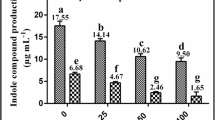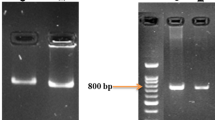Abstract
A study was conducted to examine the effect of locally isolated rhizospheric strain, Acinetobacter sp RSC9, on sugarcane plant growth, under salt stress glasshouse conditions. The selected isolate in this study was characterized based on morphology, cultural, biochemical and molecular level and identified as Acinetobacter sp RSC9 (accession number KX168051). Screening of plant growth-promoting traits revealed that the strain is able to produce IAA, solubilize phosphate, potassium and zinc and fix atmospheric nitrogen under 1% and 2% NaCl stress conditions. In a pot experiment study supplemented with 1% NaCl, the alleviation of salt stress and plant growth parameters such as plant height, the number of leaves, root fresh/dry weight and shoot fresh/dry weight were significantly improved compared to positive control. In 1% NaCl, the sugarcane treated with Acinetobacter sp RSC9 showed 39.62% and 10.22% improvement in shoot and root length, respectively, compared to the control plant. Acinetobacter sp RSC9 also showed a higher fresh weight of shoot (69.68%) and root (69.94%) in 1% NaCl salt-stressed plants. In the case of 2% NaCl, there was no seed germination due to higher salt stress; however, the pot inoculated with Acinetobacter sp RSC9—showed 100% germination. It reveals that Acinetobacter sp RSC9 has protected the plant from salinity stress and showed corresponding enhancement in growth parameters studied. Overall, the present study depicts that the Acinetobacter sp. RSC9 strain could be used as a biofertilizer for sugarcane crops grown in saline soils.



Similar content being viewed by others
Availability of Data and Materials
All data generated or analysed during this study are included in this published article.
References
Amaresan, N., K. Kumar, K. Madhuri, and G.K. Usharani. 2016. Isolation and characterization of salt tolerant plant growth promoting rhizobacteria from plants grown in Tsunami affected regions of Andaman and Nicobar Islands. Geomicrobiol Journal 33: 942–947.
Arora, N.K., T. Fatima, I. Mishra, M. Verma, J. Mishra, and V. Mishra. 2018. Environmental sustainability: Challenges and viable solutions. Environmental Sustainability 1: 309–340.
Arora, N.K., T. Fatima, J. Mishra, I. Mishra, S. Verma, R. Verma, and P. Mishra. 2020. Halo-tolerant plant growth promoting rhizobacteria for improving productivity and remediation of saline soils. Journal of Advanced Research 26: 69–82.
Bashan, Y., and G. Holguin. 1998. Proposal for the division of plant growth-promoting rhizobacteria into two classifications: Biocontrol-PGPB (plant growth-promoting bacteria) and PGPB. Soil Biology and Biochemistry 30: 1225–1228.
Bhardwaj, G., R. Shah, B. Joshi, and P. Patel. 2017. Klebsiella pneumoniae VRE36 as a PGPR isolated from Saccharum officinarum cultivar Co99004. Journal of Applied Biology and Biotechnology 5: 047–052.
Cappuccino, J.G., and N. Sherman. 2005. Microbiology: A laboratory manual. Global Edition. 10th ed. Pearson Education, p 560.
Chaudhary, T., R. Gera, and P. Shukla. 2020. Deciphering the potential of Rhizobium pusense MB-17a, a plant growth-promoting root endophyte, and functional annotation of the genes involved in the metabolic pathway. Frontiers in Bioengineering and Biotechnology 8: 617034.
Chen, Y., F. Yan, Y. Chai, H. Liu, R. Kolter, R. Losick, and J.H. Guo. 2013. Biocontrol of tomato wilt disease by Bacillus subtilis isolates from natural environments depends on conserved genes mediating biofilm formation. Environmental Microbiology 15: 848–864.
dos Santos, R.M., P.A.E. Diaz, L.L.B. Lobo, and E.C. Rigobelo. 2020. Use of plant growth-promoting rhizobacteria in maize and sugarcane: Characteristics and applications. Frontier in Sustainable Food System 4: 136.
El-Esawi, M.A., I.A. Alaraidh, A.A. Alsahli, S.A. Alamri, H.M. Ali, and A.A. Alayafi. 2018. Bacillus firmus (SW5) augments salt tolerance in soybean (Glycine max L.) by modulating root system architecture, antioxidant defense systems and stress-responsive genes expression. Plant Physiology and Biochemistry 132: 375–384.
Gupta, A., S. Rai, A. Bano, A. Khanam, S. Sharma, and N. Pathak. 2021. Comparative evaluation of different salt-tolerant plant growth-promoting bacterial isolates in mitigating the induced adverse effect of salinity in Pisum sativum. Biointerface Research in Applied Chemistry 11: 13141–13154.
Huddedar, S., A. Shete, J. Tilekar, S. Gore, D. Dhavale, and B. Chopade. 2002. Isolation, characterisation, and plasmid pUPI126-mediated indole-3-acetic acid production in Acinetobacter strains from rhizosphere of wheat. Applied Biochemistry and Biotechnology 102: 21–39.
Irizarry, I., and J. White. 2017. Application of bacteria from non-cultivated plants to promote growth, alter root architecture and alleviate salt stress of cotton. Journal of Applied Microbiology 122: 1110–1120.
Jensen, H.L. 1965 Non-symbiotic nitrogen fixation. In: Soil Nitrogen. Bartholomew, W.V., and Clark, F.E. (eds.). American Society of Agronomy Monographs 10: 436–480.
Jinal, H.N., K. Gopi, K. Kumar, and N. Amaresan. 2021. Effect of zinc-resistant Lysinibacillus species inoculation on growth, physiological properties, and zinc uptake in maize (Zea mays L.). Environmental Science and Pollution Research 28: 6540–6548.
Kang, S.M., A.L. Khan, M. Waqas, Y.H. You, J.H. Kim, J.G. Kim, M. Hamayun, and I.J. Lee. 2014. Plant growth-promoting rhizobacteria reduce adverse effects of salinity and osmotic stress by regulating phytohormones and antioxidants in Cucumis sativus. Journal of Plant Interactions 9: 673–682.
Kang, S.M., G.J. Joo, M. Hamayun, C.I. Na, D.H. Shin, H.Y. Kim, J.K. Hong, and I.J. Lee. 2009. Gibberellin production and phosphate solubilization by newly isolated strain of Acinetobacter calcoaceticus and its effect on plant growth. Biotechnol Letters 31: 277–281.
Kumar, A., R. Singh, A. Yadav, D. Giri, P. Singh, and K.D. Pandey. 2016. Isolation and characterisation of bacterial endophytes of Curcuma longa L. 3 Biotech 6: 60.
Kumar, V., N. Sharma, S.S. Maitra, and S.K. Lakkaboyana. 2020. In vivo removal of profenofos in agricultural soil and plant growth promoting activity on Vigna radiata by efficient bacterial formulation. International Journal of Phytoremediation 22: 585–593.
Leontidou, K., S. Genitsaris, A. Papadopoulou, N. Kamou, I. Bosmali, T. Matsi, P. Madesis, D. Vokou, K. Karamanoli, and I. Mellidou. 2020. Plant growth promoting rhizobacteria isolated from halophytes and drought-tolerant plants: Genomic characterisation and exploration of phyto-beneficial traits. Scientific Reports 10: 1–15.
Mudhulkar, R., S. Rajapitamahuni, S. Srivastava, S.V.V. Bharadwaj, V.P. Boricha, S. Mishra, and P.B. Chatterjee. 2018. Identification of a new siderophore acinetoamonabactin produced by a salt-tolerant bacterium Acinetobacter soli. Chemistry Select 3: 8207–8211.
Ofek, M., S. Ruppel, and Y. Waisel. 2006. Effects of salinity on rhizosphere bacterial communities associated with different root types of Vicia faba L. In Biosaline Agriculture and Salinity Tolerance in Plants, ed. M. Öztürk, Y. Waisel, M.A. Khan, and G. Görk, 1–13. Birkhäuser Basel: Springer.
Patel, P., R. Shah, B. Joshi, K. Ramar, and N. Amaresan. 2019. Molecular identification and biocontrol activity of sugarcane rhizosphere bacteria against red rot pathogen Colletotrichum falcatum. Biotechnology Reports 21: 00317.
Prittesh, P., P. Avnika, P. Kinjal, H.N. Jinal, K. Sakthivel, and N. Amaresan. 2020. Amelioration effect of salt-tolerant plant growth-promoting bacteria on growth and physiological properties of rice (Oryza sativa) under salt-stressed conditions. Archives of Microbiology 202: 2419–2428.
Prittesh, P., S. Rushabh, and M. Krunal. 2017. Isolation and characterisation of plant growth promoting potential of Acinetobacter sp. RSC7 isolated from Saccharum officinarum cultivar Co671. Journal of Experimental Biology and Agricultural Sciences 5: 483–491.
Qurashi, A.W., and A.N. Sabri. 2011. Osmoadaptation and plant growth promotion by salt tolerant bacteria under salt stress. African Journal of Microbiology Research 5: 3546–3554.
Ramesh, A., S.K. Sharma, M.P. Sharma, N. Yadav, and O.P. Joshi. 2014. Inoculation of zinc solubilising Bacillus aryabhattai strains for improved growth, mobilisation and biofortification of zinc in soybean and wheat cultivated in vertisols of central India. Applied Soil Ecology 73: 87–96.
Rashid, M.I., L.H. Mujawar, T. Shahzad, T. Almeelbi, I.M. Ismail, and M. Oves. 2016. Bacteria and fungi can contribute to nutrients bioavailability and aggregate formation in degraded soils. Microbiological Research 183: 26–41.
Rossau, R., A. van Landschoot, M. Gillis, and J. De Ley. 1991. Taxonomy of Moraxellaceae fam. nov., a new bacterial family to accommodate the genera Moraxella, Acinetobacter, and Psychrobacter and related organisms. International Journal of Systematic and Evolutionary Microbiology 41: 310–319.
Sambrook, J., F.F. Fritsch, and T. Maniatis. 1989. Molecular cloning: A laboratory manual. Cold Spring Harbor Laboratory Press.
Saravanan, V., M. Madhaiyan, and M. Thangaraju. 2007. Solubilization of zinc compounds by the diazotrophic, plant growth promoting bacterium Gluconacetobacter diazotrophicus. Chemosphere 66: 1794–1798.
Shahzad, R.K., L. Abdul, S. Bilal, M. Waqas, S.M. Kang, and I.N. Lee. 2017. Inoculation of abscisic acid-producing endophytic bacteria enhances salinity stress tolerance in Oryza sativa. Environmental and Experimental Botany 136: 68–77.
Singh, R.P., and P.N. Jha. 2016. A halotolerant bacterium Bacillus licheniformis HSW-16 augments induced systemic tolerance to salt stress in wheat plant (Triticum aestivum). Frontiers in Plant Science 7: 1890.
Shokohifard, G., K. Sakagami, R. Hamada, and S. Matsumoto. 1989. Effect of amending materials on growth of radish plant in salinised soil. Journal of Plant Nutrition 12: 1195–1214.
Shrivastava, P., and R. Kumar. 2015. Soil salinity: A serious environmental issue and plant growth promoting bacteria as one of the tools for its alleviation. Saudi Journal of Biological Sciences 22: 123–131.
Shultana, R., and A. Tan Kee Zuan, M.R. Yusop, H. Mohd Saud, and A.F. Ayanda. . 2020. Effect of salt-tolerant bacterial inoculations on rice seedlings differing in salt-tolerance under saline soil conditions. Agronomy 10: 1030.
Srivastava P., Q.S. Wu, and B. Giri. 2019. Salinity: An Overview. In: Giri, B., and A. Varma. (eds). Microorganisms in Saline Environments: Strategies and Functions. Soil Biology Springer, Cham. 56: 3–18.
Suzuki, W., M. Sugawara, K. Miwa, and M. Morikawa. 2014. Plant growth-promoting bacterium Acinetobacter calcoaceticus P23 increases the chlorophyll content of the monocot Lemna minor (duckweed) and the dicot Lactuca sativa (lettuce). Journal of Bioscience and Bioengineering 118: 41–44.
Turan, V. 2019. Confident performance of chitosan and pistachio shell biochar on reducing Ni bioavailability in soil and plant plus improved the soil enzymatic activities, antioxidant defense system and nutritional quality of lettuce. Ecotoxicology and Environmental Safety 183: 109594.
Turan, V. 2020. Potential of pistachio shell biochar and dicalcium phosphate combination to reduce Pb speciation in spinach, improved soil enzymatic activities, plant nutritional quality, and antioxidant defense system. Chemosphere 245: 125611.
Turan, V., P. Schröder, S. Bilen, H. Insam, and M.F.D. Juarez. 2019. Co-inoculation effect of Rhizobium and Achillea millefolium L. oil extracts on growth of common bean (Phaseolus vulgaris L.) and soil microbial-chemical properties. Scientific Reports 9: 1–10.
Vurukonda, S.S.K.P., S. Vardharajula, M. Shrivastava, and S.Z. Ali. 2016. Enhancement of drought stress tolerance in crops by plant growth-promoting rhizobacteria. Microbiological Research 184: 13–24.
Wang, Y., K. Li, and X. Li. 2009. Auxin redistribution modulates plastic development of root system architecture under salt stress in Arabidopsis thaliana. Journal of Plant Physiology 166: 1637–1645.
Xie, J., Z. Yan, G. Wang, W. Xue, C. Li, X. Chen, and D. Chen. 2021. A bacterium isolated from soil in a Karst rocky desertification region has efficient phosphate-solubilizing and plant growth-promoting ability. Frontiers in Microbiology 11: 3612.
Acknowledgements
The authors thank UTU management for providing constant support and the necessary facility to carry out the research work.
Funding
Not applicable.
Author information
Authors and Affiliations
Contributions
PP, RK, and NA designed the study and edited and wrote the final manuscript; HG performed the experiments; and BJ analysed the data.
Corresponding author
Ethics declarations
Ethical Approval
Not applicable.
Consent to Participate
Not applicable.
Consent to Publish
Not applicable.
Conflict of interests
The authors declare that they have no conflict of interest.
Additional information
Publisher's Note
Springer Nature remains neutral with regard to jurisdictional claims in published maps and institutional affiliations.
Rights and permissions
About this article
Cite this article
Patel, P., Gajjar, H., Joshi, B. et al. Inoculation of Salt-Tolerant Acinetobacter sp (RSC9) Improves the Sugarcane (Saccharum sp. Hybrids) Growth Under Salinity Stress Condition. Sugar Tech 24, 494–501 (2022). https://doi.org/10.1007/s12355-021-01043-w
Received:
Accepted:
Published:
Issue Date:
DOI: https://doi.org/10.1007/s12355-021-01043-w




